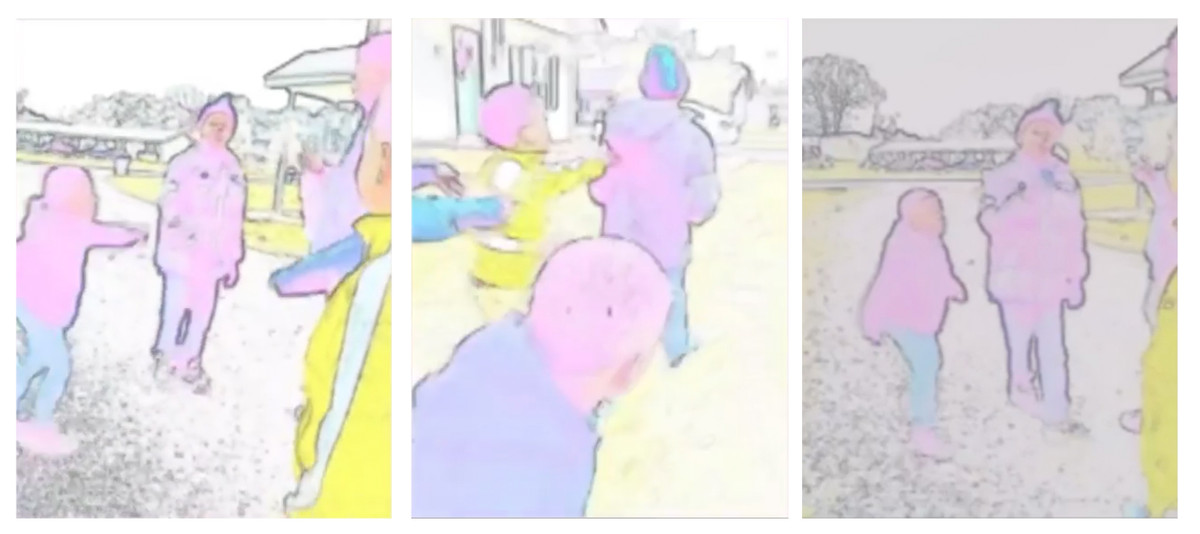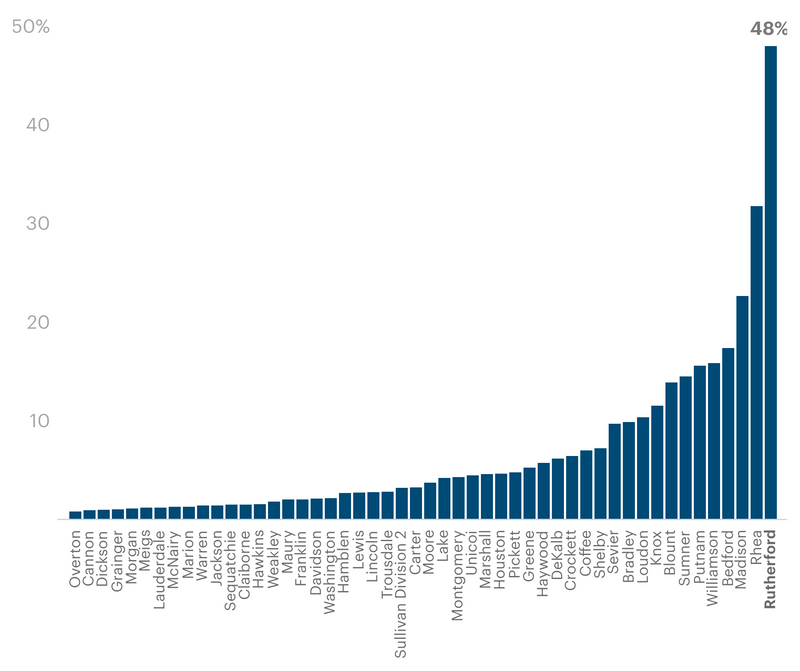Black Children Were Jailed for a Crime That Doesn’t Exist. Almost Nothing Happened to the Adults in Charge.
Judge Donna Scott Davenport oversees a juvenile justice system in Rutherford County, Tennessee, with a staggering history of jailing children. She said kids must face consequences, which rarely seem to apply to her or the other adults in charge.
by Meribah Knight, Nashville Public Radio, and Ken Armstrong, ProPublicaOct. 8, 2021, 5 a.m. EDT
Co-published with Nashville Public Radio
Series:Juvenile Injustice, Tennessee
Where Kids Meet the Rule of Law
This article was produced for ProPublica’s Local Reporting Network in partnership with Nashville Public Radio. Sign up for Dispatches to get stories like this one as soon as they are published.https://audm.herokuapp.com/player-embed/?pub=propublica&articleID=black-children-jailed-crime
Chapter 1: “What in the World?”
Friday, April 15, 2016: Hobgood Elementary School, Murfreesboro, Tennessee
Three police officers were crowded into the assistant principal’s office at Hobgood Elementary School, and Tammy Garrett, the school’s principal, had no idea what to do. One officer, wearing a tactical vest, was telling her: Go get the kids. A second officer was telling her: Don’t go get the kids. The third officer wasn’t saying anything.
Fact-based, independent journalism is needed now more than ever.Donate
Garrett knew the police had been sent to arrest some children, although exactly which children, it would turn out, was unclear to everyone, even to these officers. The names police had given the principal included four girls, now sitting in classrooms throughout the school. All four girls were Black. There was a sixth grader, two fourth graders and a third grader. The youngest was 8. On this sunny Friday afternoon in spring, she wore her hair in pigtails.
A few weeks before, a video had appeared on YouTube. It showed two small boys, 5 and 6 years old, throwing feeble punches at a larger boy as he walked away, while other kids tagged along, some yelling. The scuffle took place off school grounds, after a game of pickup basketball. One kid insulted another kid’s mother, is what started it all.

The police were at Hobgood because of that video. But they hadn’t come for the boys who threw punches. They were here for the children who looked on. The police in Murfreesboro, a fast-growing city about 30 miles southeast of Nashville, had secured juvenile petitions for 10 children in all who were accused of failing to stop the fight. Officers were now rounding up kids, even though the department couldn’t identify a single one in the video, which was posted with a filter that made faces fuzzy. What was clear were the voices, including that of one girl trying to break up the fight, saying: “Stop, Tay-Tay. Stop, Tay-Tay. Stop, Tay-Tay.” She was a fourth grader at Hobgood. Her initials were E.J.
The confusion at Hobgood — one officer saying this, another saying that — could be traced in part to absence. A police officer regularly assigned to Hobgood, who knew the students and staff, had bailed that morning after learning about the planned arrests. The thought of arresting these children caused him such stress that he feared he might cry in front of them. Or have a heart attack. He wanted nothing to do with it, so he complained of chest pains and went home, with no warning to his fill-in about what was in store.
Also absent was the police officer who had investigated the video and instigated these arrests, Chrystal Templeton. She had assured the principal she would be there. She had also told Garrett there would be no handcuffs, that police would be discreet. But Templeton was a no-show. Garrett even texted her — “How’s timing?” — but got no answer.
Instead of going to Hobgood, Templeton had spent the afternoon gathering the petitions, then heading to the Rutherford County Juvenile Detention Center, a two-tiered jail for children with dozens of surveillance cameras, 48 cells and 64 beds. There, she waited for the kids to be brought to her.
In Rutherford County, a juvenile court judge had been directing police on what she called “our process” for arresting children, and she appointed the jailer, who employed a “filter system” to determine which children to hold.
The judge was proud of what she had helped build, despite some alarming numbers buried in state reports.
Among cases referred to juvenile court, the statewide average for how often children were locked up was 5%.
In Rutherford County, it was 48%.
Rutherford County Locked Up Kids in Almost Half of Cases
Tennessee used to publish statistical reports on juvenile courts statewide. For the last year available, 2014, we compiled reports for all 98 courts. Rutherford County locked up kids in 48% of its cases, eclipsing every other jurisdiction. (The graphic below shows the top 50 courts.) The state stopped publishing this data even as it figured prominently in a lawsuit against Rutherford County.

In one case, we obtained through public records requests 38 hours of audiotaped interviews conducted by Murfreesboro police as part of their investigation. That investigation included interviews with the school’s principal, Tammy Garrett, and 13 police officers, including Chrystal Templeton (who was interviewed twice for a total of seven hours), Chris Williams, Albert Miles III, Jeff Carroll and five higher-ups. Other materials we drew upon included videotape of the kids’ scuffle; the final report of the Murfreesboro Police Department’s internal review; the Metro Nashville Police Department’s external review; juvenile petitions; settlement agreements; and an email that Miles wrote to an investigator describing his conversation with a parent.
For this story we interviewed dozens of people, including children arrested in the April 2016 case and their parents. We interviewed, for the first time, the kids (now adults) whose cases launched class-action lawsuits against the county over its illegal detention practices and use of solitary confinement. We obtained thousands of pages of documents through 56 records requests to city, county and state agencies. We obtained more than a dozen personnel files and reviewed court records in seven federal lawsuits.
Donna Scott Davenport declined to be interviewed. But we listened to or transcribed more than 60 hours of her on the radio. We obtained her deposition and hearing testimony from a class-action lawsuit. Other records we relied on included disciplinary records from the Tennessee Board of Judicial Conduct; two personnel files; memos and emails; videotaped appearances before the Rutherford County Commission and a canvass of appellate opinions in cases she had handled in juvenile court. We also listened to the oral arguments from some appellate cases.
Lynn Duke declined to be interviewed. But she often appears before the county’s Public Safety Committee, and we watched and reviewed 137 of those meetings spanning 2009 to 2021. We obtained three depositions in which she was questioned. We reviewed her personnel file and drew upon her court testimony, memos and emails, as well as the detention center’s written operating procedures.
We reached out to each of the police officers named in our story. They each declined to be interviewed or didn’t respond. The sergeant who supervised Templeton also declined to be interviewed.
Michael Wrather, a Rutherford County commissioner, declined to be interviewed other than to say he stands behind his public comments praising Davenport.
We relied on reports and sometimes data from the Tennessee Department of Children’s Services, the Tennessee Council of Juvenile and Family Court Judges, and the Tennessee Comptroller of the Treasury. We used Prison Rape Elimination Act audits and the 2004 consultant’s report from Pulitzer/Bogard & Associates. We also drew upon reporting from fellow news organizations, including Murfreesboro’s Daily News Journal, The Tennessean, the Murfreesboro Post and the Tennessee Lookout.
We’re planning to continue reporting on the juvenile justice system in Rutherford County and elsewhere in Tennessee. If you have any stories that you’d like to share, please get in touch. Meribah Knight’s email address is mknight@wpln.org, and Ken Armstrong’s is ken.armstrong@propublica.org.
Editing by Emily Siner of WPLN News and Sarah Blustain and Susan Carroll of ProPublica. Alex Mierjeski contributed reporting.
READ THE FULL REPORT FROM PRO-PUBLICA
How We Reported This Story
When the four girls were arrested at Hobgood Elementary School in 2016, media covered the community’s reaction and the immediate fallout. But left unknown was all that led up to the arrests; what the children, police and school officials, experienced, in their voices; and what the case revealed about the county’s failed juvenile justice system as a whole.
To reconstruct the Hobgood Elementary case, we obtained through public records requests 38 hours of audiotaped interviews conducted by Murfreesboro police as part of their investigation. That investigation included interviews with the school’s principal, Tammy Garrett, and 13 police officers, including Chrystal Templeton (who was interviewed twice for a total of seven hours), Chris Williams, Albert Miles III, Jeff Carroll and five higher-ups. Other materials we drew upon included videotape of the kids’ scuffle; the final report of the Murfreesboro Police Department’s internal review; the Metro Nashville Police Department’s external review; juvenile petitions; settlement agreements; and an email that Miles wrote to an investigator describing his conversation with a parent.
For this story we interviewed dozens of people, including children arrested in the April 2016 case and their parents. We interviewed, for the first time, the kids (now adults) whose cases launched class-action lawsuits against the county over its illegal detention practices and use of solitary confinement. We obtained thousands of pages of documents through 56 records requests to city, county and state agencies. We obtained more than a dozen personnel files and reviewed court records in seven federal lawsuits.
Donna Scott Davenport declined to be interviewed. But we listened to or transcribed more than 60 hours of her on the radio. We obtained her deposition and hearing testimony from a class-action lawsuit. Other records we relied on included disciplinary records from the Tennessee Board of Judicial Conduct; two personnel files; memos and emails; videotaped appearances before the Rutherford County Commission and a canvass of appellate opinions in cases she had handled in juvenile court. We also listened to the oral arguments from some appellate cases.
Lynn Duke declined to be interviewed. But she often appears before the county’s Public Safety Committee, and we watched and reviewed 137 of those meetings spanning 2009 to 2021. We obtained three depositions in which she was questioned. We reviewed her personnel file and drew upon her court testimony, memos and emails, as well as the detention center’s written operating procedures.
We reached out to each of the police officers named in our story. They each declined to be interviewed or didn’t respond. The sergeant who supervised Templeton also declined to be interviewed.
Michael Wrather, a Rutherford County commissioner, declined to be interviewed other than to say he stands behind his public comments praising Davenport.
We relied on reports and sometimes data from the Tennessee Department of Children’s Services, the Tennessee Council of Juvenile and Family Court Judges, and the Tennessee Comptroller of the Treasury. We used Prison Rape Elimination Act audits and the 2004 consultant’s report from Pulitzer/Bogard & Associates. We also drew upon reporting from fellow news organizations, including Murfreesboro’s Daily News Journal, The Tennessean, the Murfreesboro Post and the Tennessee Lookout.
We’re planning to continue reporting on the juvenile justice system in Rutherford County and elsewhere in Tennessee. If you have any stories that you’d like to share, please get in touch. Meribah Knight’s email address is mknight@wpln.org, and Ken Armstrong’s is ken.armstrong@propublica.org.
Editing by Emily Siner of WPLN News and Sarah Blustain and Susan Carroll of ProPublica. Alex Mierjeski contributed reporting.
Filed under —

